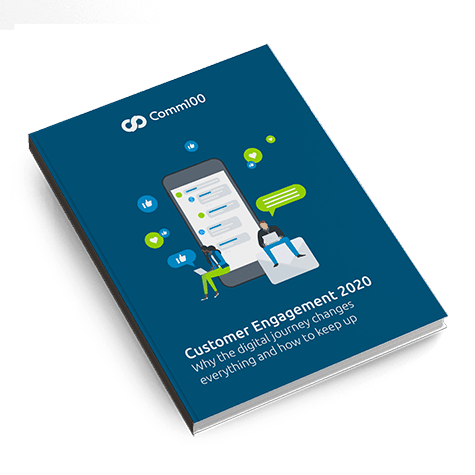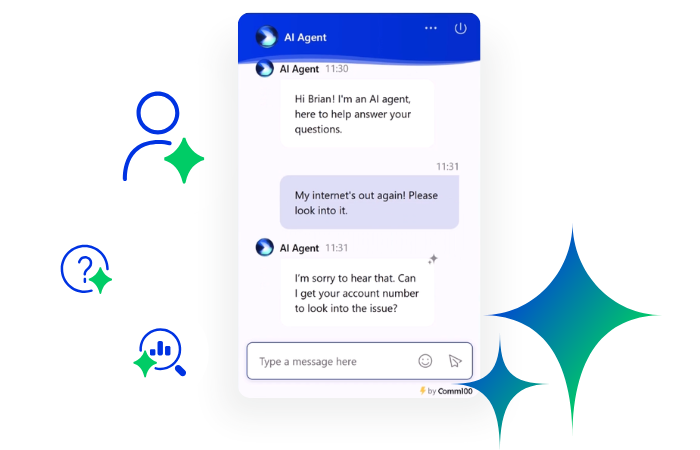Long gone are the days when customer service teams could offer just one communication channel to their customers. Today’s consumer wants choice. They want to decide whether to drop you an email, talk with a live chat agent, post a question on Facebook, or even text you through SMS. It’s not up to the brand how they communicate to the customer – it’s up to the customer to choose how they speak to the brand.
Providing many communication channels is often referred to as multi channel support, or multi channel customer service. Most companies now offer this, and it’s the first step to good customer service – but it’s no longer enough.
With multichannel customer service, each communication channel is managed within a separate platform or system. This means that the channels are siloed from one another, and this causes a huge host of problems (which we get into below). On the other hand, omnichannel customer service intelligently connects every channel together and allows agents to manage them from a single, unified console.
So why is it so important to connect every communication channel together with omnichannel support? Here’s a breakdown of the key benefits of omnichannel support as we explore the battle of omnichannel vs multichannel support.
1. Empower your agents with 360-degree insight
Because omnichannel customer support fuses every channel together, agents can see every contact’s full conversation history across every channel. On top of this, with a true omnichannel platform that integrates with a CRM system, they can also see purchase history, web page visits, and other key data, giving them a 360-degree view of the customer and their issue.
This empowers your agents to provide more accurate and more helpful support to every customer. And with so much information at their fingertips, they can also provide more individualized support and develop more personal relationships to make every customer feel valued.
What’s more, because the agent has total visibility into previous conversations, even if the customer is passed between agents or changes channels themselves, they never have to repeat themselves.
2. Deliver faster resolutions
With multichannel customer service, agents have to continually switch between different applications to respond to queries. This adds complexity and naturally impedes agent efficiency.
Worse still, if a customer reaches out on one channel, and then another, the agent has to spend time trying to find all the relevant information and piecing together the story from different channels. This slows down resolution speed and leads to much longer wait times. With omnichannel, all relevant information is conveniently knitted together within the agent console to accelerate response and resolution time.
A comprehensive omnichannel platform will also have an integrated knowledge base containing a repository of help articles that can be both customer- and agent-facing. Your customers can access the knowledge base from your website or within the live chat window and find answers themselves without having to speak to an agent. Should they need more help, they can easily start a chat with an agent who can search for additional information within the knowledge base.
3. The right channel for the job
Sometimes a customer will reach out to on a channel that isn’t best suited to resolve their issue. For example, they may send a message on Twitter about a billing issue which would be better resolved over email.
Because channels are disconnected within a multichannel customer service strategy, it would be very difficult to smoothly switch between these channels for both the customer and the agent. With omnichannel, it’s a breeze. The agent simply suggests moving the conversation from Twitter to email and (should the customer agree), changes the channel from a dropdown menu within the chat window – and the conversation seamlessly continues on the new channel.
Likewise, if a customer sends a message on email but then decides they would rather talk over live chat for a faster response, they too can simply start a new conversation on live chat and the agent will know what their issue is and be able to start helping straightaway.
4. The best agent for the job
By having a wealth of insight about the customer from every channel, customer service teams using an omnichannel platform can route every query to the most suitable agent or department – even before the conversation has begun.
Managers can set up pre-chat surveys that help categorize customer issues, and then route them to the agent or department that’s best equipped to help. Take it up a gear, and automatically route a chat based on the visitor’s location, source, navigation and purchase history, and much more. For example, if a VIP repeat customer requests a live chat, you can automatically route the chat to a senior agent with a lot of experience to make sure they get the very best treatment. Or perhaps an individual with a specific account manager sends an email to your customer service team – set up a rule to make sure that this email is directly routed to the account manager for optimal response.
Robust routing coupled with queue management capabilities will ensure that chats are picked up by the right agents, on the right teams, at precisely the right time. Say goodbye to yesterday’s multi channel customer service software, and hello to today’s omnichannel insight.
If you want to explore the differences of omnichannel vs multichannel support more, and how omnichannel lets you handle interactions across channels with more control and less effort, download the guide below:
Download now: Customer Engagement 2021 White Paper
Digital omnichannel is the next big thing of the new decade. Found out which digital channels are right for you and how to structure your customers’ journeys across them to ensure you are satisfying today’s customer experience expectations.
Download Now
White Paper







